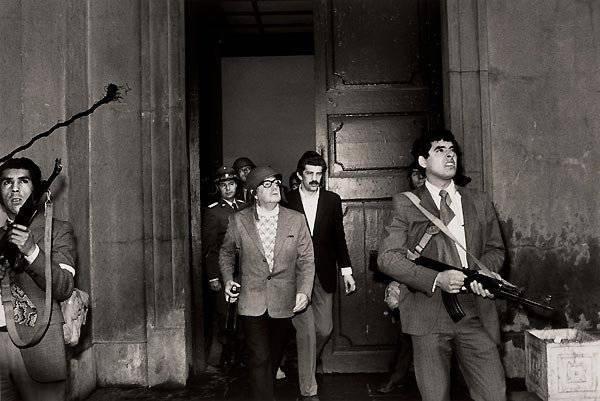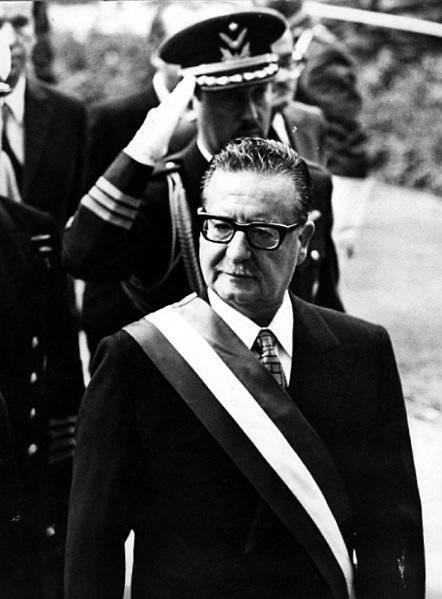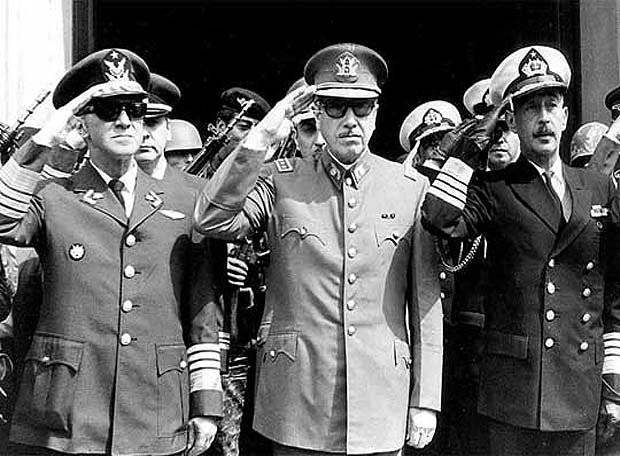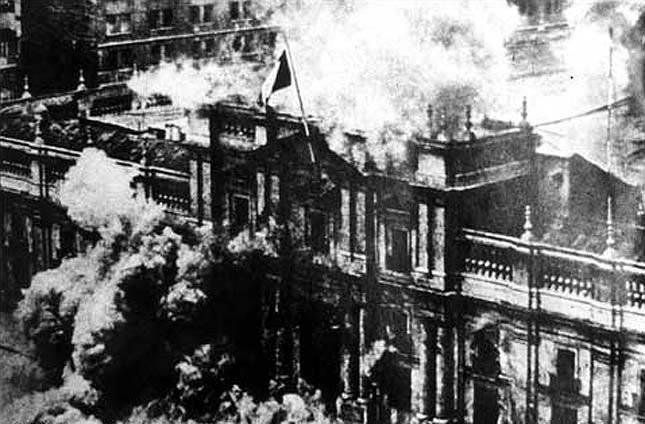Military coup 1973 of the year in Chile. The neoliberal myth of Pinochet
The Chilean Air Force bombed Portales and Corporations radio stations that supported Popular Unity and the legitimate president. What is interesting planes of the Chilean Air Force destroyed two television towers, which stood in the capital of Chile. This strike is reminiscent of the events of September 11 2001 (the organizers are the same). In 9: 10 in the morning was followed by the last address of the president, he was transmitted by the radio station Magallanes. Then the air force hit her and the rebels captured her. Several dozen radio employees were killed. Then shelling and storming of the presidential palace began, which protected about 40 people. Through the 8 hours, Allende was dead. While in the blazing presidential palace, Allende released those who could not fight, and he himself led the defense. He shot down a rebel tank from a grenade launcher and fell with a Kalashnikov in his hands.
So, in Chile there was a military coup, as a result of which the military junta led by the head of the military department, General Augusto Pinochet, overthrew the country's president, Salvador Allende, and the government of the People’s Unity. The coup was prepared and carried out under the direct supervision of the CIA.

Salvador Allende refused to leave the presidential palace during the coup and resisted to the end with weapons in hand.
What caused the coup
3 November 1970 was Chile's Salvador Allende Gosens. He was previously the general secretary of the Socialist Party of Chile, he created the Popular Socialist Party. Then he returned to the Socialist Party, created an alliance with the Communists - Front "Popular Action". Nominated for president in 1952, 1958 and 1964. In 1969, the Front "Popular Action" was transformed into Popular Unity. The coalition included socialists, communists, members of the Radical Party and part of the Christian Democrats. In the 1970 election year, Allende stepped forward with a slight margin, overtaking the candidate of the National Party.
The economic program of Allende provided for the nationalization of the largest private companies and banks. Agrarian reform led to the expropriation of private estates. In the first two years of the government, Allende expropriated approximately 500 thousand hectares of land (about 3500 estates), which accounted for about one-fourth of the total land cultivated in the country. Given the land expropriated under the previous government, reorganized the agricultural sector amounted to about 40% of all agricultural land in the state. Naturally, such a policy met with resistance and sabotage by the landowners (large landowners). Began mass slaughter of cattle, from the estates on the Chilean-Argentine border, cattle were distilled to Argentina. This led to a deterioration in the economic situation of the country.
There was tension in relations with Washington, which defended the interests of American firms. The United States organized a boycott of Chilean copper, and copper exports gave the country major foreign exchange earnings. Chilean accounts have been frozen. Credits were not given. Many Chilean entrepreneurs began to transfer capital abroad, curtail business, reduce jobs. An artificial food shortage was created in the country.
In the years 1972-1973. external and internal opponents of Allende organized mass demonstrations and strikes. The main initiator of the strike was the Confederation of Truck Owners. A state of emergency was introduced in the country; the president ordered the confiscation of idle trucks. In November 1972, a new government was created, where the military occupied important posts. Former Army Commander General Carlos Prats Heads the Ministry of Internal Affairs, Rear Admiral Ismael Huerta - Ministry of Public Works, Brigadier General aviation Claudio Sepulveda - Ministry of Mining. The country was divided into two hostile camps, opponents and supporters of reform.
I must say that, in general, the reforms of Alenda were aimed at improving the well-being of the majority of the population. The interest rate of the agricultural loan was reduced, tens of thousands of new jobs were created, unemployment went down, the wages of low-wage categories of workers rose, the subsistence minimum increased, the minimum wages and pensions increased, and the purchasing power of the population increased. The government has developed a system of numerous allowances and benefits, has democratized medical services and schools. Naturally, major proprietors, latifundists, and the bourgeoisie of a comprador nature came under attack. And they did not want to give up their positions. The blessing had a powerful ally - the United States.

Salvador Allende Gossens - a man who wanted to free Chile from imperialist dependence and the robbery of corporations.
US Goals and Transnational Structures
Washington did not want a second “continental Cuba” to appear in Latin America. Allende nationalized the enterprises of large-scale industry and, in the interests of the people, began an agrarian reform. Thus, the geopolitical interests of the United States - the desire to keep Chile in the orbit of its influence, coincided with the interests of American corporations. Inside Chile, the Americans had strong support in the face of large owners.
Tactically required to displace the legitimately elected socialist President Salvador Allende, to crush the socialist, left-wing movement in Chile. And it was necessary to do this as tough as possible, revealing. Return Chile under the control of TNK, TNB. To return the nationalized enterprises to the previous owners, including American corporations. It was necessary to stop the transformation of a socialist nature.
In strategic terms, a good example of Chile’s socialist course was dangerous for the US government and transnational corporations and banks in Latin America. Cuba has already been lost. In many countries of South America, strong armed revolutionary groups emerged, which set the course for liberating their countries from the neo-colonial dependence and plunder of TNCs and TNBs, and the socialist revolution, following the example of Russia and Cuba. The United States and transnational structures are facing the threat of losing a significant part or all of Latin America. Especially the threat would have increased while maintaining the Stalin course in the USSR. With the support of the USSR, Latin American countries could free themselves from dependence. Unfortunately, treason seeds have already sprouted in the USSR. Moscow did not use a powerful tool in the form of the KGB to provide effective assistance to Allende.
The victory of Allende and his reforms in Chile opened up a direct path to the possibility of proclaiming a socialist course and the emergence of a second bridgehead of socialism in Latin America. It is clear that such an opportunity had to be stopped at any cost, burned with a hot iron.
How are the coups
The most complete description of the coup 1973 of the year is contained in a separate report of the US Senate Commission on operations in Chile. According to him, 13 million was spent on organizing a coup. The Americans acted simultaneously in several key areas. The money went to support political parties that beat opponents of left-wing movements. First of all, they supported the Christian Democrats. They financed the opposition press, mainly the giant El Mercurio newspaper. Americans fueled the strike movement. In particular, the movement of truck owners in 1972-1973 years paralyzed the Chilean economy (trucks carried up to 80% of goods to the country). Financial assistance was provided to the right-wing terrorist organization Patria and Lebertad. The Chilean government was pressured by delaying loans, both at the private and public levels. Weapons were delivered to terrorist groups. In 1970, money was allocated against the Allende election campaign. During the election year 1970 Americans spent about 0,5 million dollars.
7 September 1973, the American ambassador to Chile, Nathaniel Davis, immediately flew to Washington. He held a confidential meeting with Henry Kissinger and 9 September returned to Santiago. The Chilean ambassador to Mexico, Hugo Vigoren, said that a few days after the coup, he saw documents that the former CIA agent showed him, and they outlined a plan for the overthrow of Allende (the “Centaurus Plan”).
It should be noted that Allende practically deprived himself of the main support. In August 1973, the military, led by Pinochet organized a provocation against General Prats, to remain loyal to the Popular Unity government. Prats resigned. The president appointed General Pinochet in his place. 23 August Carlos Prats remarked in his diary: “My career has ended. Without exaggerating my role, I believe that my resignation is the prelude to a coup d'état and the greatest betrayal ... Now it only remains to fix the day of the coup ... ”. On the possibilities of Prats say the events of the coup, when the CIA used an interesting psychological method (method of unstructured management). A rumor was spread in Santiago that a brigade under the command of Prats (he was under house arrest at that time) was approaching the capital from the north, and volunteer detachments joined it. As a result, the active supporters of Allende in Santiago believed so desired information and waited for the arrival of "reinforcements". The coup organizers managed to avoid large-scale confrontation with Allende’s supporters in the capital and triumph, although there were well-prepared and well-organized groups of supporters of the legitimate president in Chile and in neighboring countries.
Why was Allende so careless? Many researchers believe that Salvador Allende underestimated the danger of a coup, as he belonged to the Chilean aristocracy and was a freemason (he himself admitted to this). According to Masonic ethics, you cannot touch "your own". Pinochet was also a Freemason, and he was not supposed to go against the "brother." However, Allende clearly miscalculated. Freemasons are not the highest positions in the Western hierarchy. Allende’s actions harmed the US, transnational corporations, so he was sentenced. Peaceful attempts - through elections, strikes, did not lead to the fall of Allende, so they went to extreme measures. Moreover, the people's unity was suppressed with maximum and demonstrative cruelty, so that others were discouraged.
"Patria y Libertad". 30 July 1971, the American president, Richard Nixon, replaced the ambassador to Chile, Ed Corrie, with Mr. Davis, who was known to be a specialist in "Communist countries." Davis in 1956 -1960 headed the department of the USSR in the US State Department. He was an envoy to Bulgaria and an ambassador to Guatemala. In Guatemala, it was marked as the "father" of the "Black Hands" - a paramilitary organization which was engaged in the organization and conduct terrorist attacks against representatives of the left-wing movement. In addition, Mr. Davis was considered the organizer of supporting espionage organization "Peace Corps", which is the beginning of the coup in Chile had hundreds of informants. The activity of the Corps was so frank that already in 1969, Deputy Louis Figueroa, chairman of the Unified Labor Union of Chile, accused him of espionage activities.
10 September 1970, following the example of Black Hand, the CIA created the Patria and Libertad movement (Homeland and Freedom) movement in Chile. Its formal leader was Pablo Rodriguez. The movement “Homeland and Freedom” was supposed to organize the opponents of Alenda. Combat groups were created, where fighters were trained, teaching them shooting and hand-to-hand combat skills. The leader of the military organization was Roberto Temier. In addition, training camps were established outside of Chile. In particular, such a camp was organized in Vyacha, thirty kilometers from La Paz. Its leader was the former major of the Chilean army Arturo Marshall. The number of militants reached 400 people. Among the leaders of the "Motherland and Freedom" stood out Ivan Feldes. He was in charge of communication. He imported equipment into Chile that allowed intercepting the ciphering of intelligence services of all three branches of the armed forces and, if necessary, paralyzing the entire internal communications network in the country. Sponsored motion of the president of the Association of Industrial Development Orlando Sáez and large landowner Benjamin Matte, who represented the National Association of Agriculture. Militants "Freedom" acted in close cooperation with criminal elements.
Patria and Libertad organized riots, attacks on state institutions, educational institutions, premises of the socialist party, leaders of the communist and socialist parties, journalists who expressed the interests of the People’s Unity. The organization was openly terrorist. 17 1973 June, the gun fired from the premises of the Communist Party in Nuño, attacked the premises of the Socialist Party in Barrancas. 20 Jun bombed national television in Santiago. 26 June were fired upon public buildings in Santiago. Similar incidents occurred almost every day: shelling, explosions, attacks, beatings, arson, etc. The bandits blew up bridges, railways, electrical substations and other important objects. Due to a power outage, industrial refrigerators stopped working, and by August the country had lost half of the fruits and vegetables that had been harvested. Due to the sabotage of communications, the supply of food to the provinces was disrupted. Truckers who delivered food to work areas were beaten and killed. The situation in the country was prepared for the hour "X".
On June 29, Freedom militants held a real rehearsal for a future coup. In the morning in Santiago from the location of the 2nd Armored Regiment several left on the street. tanks, armored vehicles and trucks with soldiers. Having left on Bulnes Square, one of the tanks fired at the presidential palace, other vehicles moved to the Ministry of Defense. The Sherman tank approached the building’s facade, climbed the flights of stairs, hit the door with a blow from the hull, and shot at the lobby. This rebellion was crushed in the evening. The military prosecutor's office conducted an investigation and found out that “Homeland and Freedom” was behind the rebellion.
Pinochet was a screen. All organizational work was carried out by professionals from the CIA. All the threads stretched to the National Security Council, led by Henry Kissinger. The organization of economic sabotage and strangulation of Chile was answered by Dean Roesh Hunton. In 1971, he was appointed Deputy Chairman of the Council on International Economic Policy. Hunton in Guatemala, together with Nathaniel Davis, organized the "counter-revolution". The second envoy of the American Embassy in Chile was Harry W. Shlademan. Prior to that, he worked in Bogota, Bulgaria, and the Dominican Republic. Daniel Arzak, James E. Anderson, Dealon B. Tipton, Raymond Alfred Warren, Arnold M. Isaacs, Frederick W. Latras, Joseph F. McManus, Kate Willock (he was the organizer of the “Patria and Libertad "), Donald Winters et al.

The neoliberal myth of Pinochet
In the years of the dominance of liberal ideology in Russia, the myth of the beneficent rule of Pinochet, of the "economic miracle" in Chile, was launched. Pinochet seized power, began to pursue a liberal policy in the spirit of "shock therapy" of Yegor Gaidar in the early 1990-years in Russia. Such a policy did not lead to an “economic miracle”. The economy has not even returned to the level of development achieved under Allende. One tenth of the population left the country. These were mainly qualified specialists, since simple peasants did not have the material opportunity to leave.
Chile became the first country in the world to introduce the ideas of the Nobel laureate 1976 Mr. Milton Friedman. Pinochet's advisers were the so-called. "Chicago boys" - followers of the views of Friedman. Chile was offered a stabilization program where the monetarist approach was based (it was the basis of all IMF programs). Monetarists see the root of all evil in the excess of money in circulation, of the state policy of "cheap money" and inordinate issue that leads to inflation. For the "recovery" of the economy, they propose to reduce the amount of money through tight credit and budget policies. The budget deficit is reduced by reducing state programs, including social spending, investments, subsidies, etc. In Russia, to date, such figures (or pests?) Dominate the economy and finance. They see salvation in a sharp reduction in costs. While Roosevelt, Stalin and Hitler achieved great success, investing a lot of money in the development of the country's infrastructure.
Monetarists propose to reduce consumer spending by reducing or freezing wages. In addition, this measure leads to a reduction in production costs. In the banking sector - the policy of "expensive money", an increase in interest rates. Devaluation of the national currency, the reduction of the state issue of money. Restriction of state regulation of prices and foreign trade (export-oriented industries benefit from this).
In Chile, reduced wages, reduced the number of people employed in the public sector. State subsidies have been canceled. Educational and health programs have been cut off from state funding (just a dream of Russian “liberal fascists”!). The deficit of the state budget began to cover mainly IMF loans. Money emission was reduced to almost zero (in 1985, the total 0,2% of GDP).
More than a third of the population was thrown into poverty. There has been a sharp deepening of social inequality and poverty. For example, the director of a paper and paperboard company received 4,5 million pesos a year, and a nurse 30 thousand pesos (150: 1 ratio, respectively). Economically, the country began to resemble a classical colony, a raw materials appendage of the West. Due to external debts, there was practically a loss of national independence. For two decades, Chile was put in debt: with 3 billion US dollars in 1973, the country's external debt increased to 17 billion dollars in 1982, and in 1993, it grew to 21 billion dollars.
Under the national economy laid the "bomb" in the form of a sharp drop in government spending on infrastructure (railways, power lines, schools, hospitals and so on. D.). From 1973 to 1982, infrastructure development figures fell by 22%. In particular, while in 1973, Chile was ahead of Latin America in the production of electricity by 50%, over the 20 years, electricity generation grew only by 1%. Lack of investment in this area of the economy - this is one of the characteristic features of the neoliberal "stabilization" programs (in reality it is a stable degradation). This is a real nuclear time bomb for the national economy. The example of Ukraine and the Russian Federation who have fallen into the same trap is obvious. Both states were led by Western and homegrown neoliberals, consuming the Soviet legacy and not developing infrastructure. Now we need hundreds of billions for major repairs, complete replacement and modernization of the country's infrastructure.

Bombing of the presidential palace "La Moneda" during the military coup in Chile.
Information